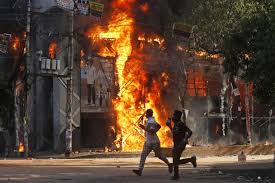The unceremonious removal of Sheikh Hasina has dealt a blow to the hope—rekindled during her regime—of a much-awaited renaissance of an all-inclusive Bengali state, envisioned by poets like Nazrul Islam and Rabindranath Tagore by Gopal Misra

The recent mass violence in Bangladesh has not only dealt a blow to its fragile democracy, but has also undermined the state’s nascent secular character. The century-old struggle for fair play, progressive ideas and democratic values, however, cannot be subdued forever; they might flare up in a confrontation like the upheaval the country had witnessed in 1971.
It wasn’t just the illegal removal of an elected prime minister, Sheikh Hasina, conspired by the country’s army, the liberally funded radical Islamists by international forces comprising the US and China, and a section of its much trumpeted academia represented by Muhammad Yunus, a noted economist and Nobel laureate.
During the past 250 years, the region was being targeted by the newly emerging colonial forces of Europe. It was natural for them to be lured by vast fertile lands and having precious minerals in its belly such as coal, bauxite and many others. It was the ‘Sonar Bengal’. The scholars of these golden lands have also led the world in pursuit of knowledge whether it was humanities, literature or the frontier of science. In spite of the natural and human resources, the region has been suffering a political crisis for decades in recent years, a hotbed of international conspirators.
Exit of Hasina
The unceremonious removal of Sheikh Hasina, who had rekindled the hope of a much-awaited renaissance of an all inclusive Bangali state, dreamt by poets like Nazrul Islam, Ravindra Nath Tagore, and the revolutionaries like Ras Bihari Bose, Arvind Ghosh and many known and unknown soldiers has given a death blow to the contributions of Bengal in every field of the Indian renaissance. Therefore, in this context, Muhammad Yunus’s veiled warning regarding her taking refuge in India is not only uncalled for, but also reflects his poor understanding of his country’s history. The world acclaimed economist, respected for his initiative in extending much needed financial support to the poor, perhaps, has sullied his image by hobnobbing with forces inimical to his own country.

Being just a banker, Yunus, perhaps, considers Bangladesh just a physical territory; he forgets that Bengal is the symbol that has led to the concept of modern India. Even in the contemporary world , the Bose particle has re-scripted our traditional understanding of the universe. The history of modern India cannot be presented without the contributions of Bengal. The soldiers for India’s independence have always been inspired by the vibrant Bengali culture. The clarion call – Dill Chalo – of Subhash Chandra Bose had reaffirmed the irrepressible spirit of Bengal. Therefore, the unceremonious eviction of Hasina on August 5 was not only a setback to the democracy in Bengal, but it has angered democracy-loving people even in Lahore and Peshawar across the Indian subcontinent. Hasina might have lost the battle for democracy, but the war, perhaps on a much bigger scale than the 1971 uprising, could be awaiting to engulf Bangladesh.
The recent political developments in Dhaka must have dismayed the country’s most respected political scientist, Imtiyaz Ahemed, who is known across counties for his deep studies regarding mass violence. He might have never expected that his country’s chiefs of army, navy and air force would physically remove an elected prime minister. Her forced resignation was announced by the army chief instead of the country’s president. The army chief was scared that the President, Shabuddin, might refuse to accept the resignation obtained forcefully. He announced her so-called voluntary resignation only after the departure of her helicopter.
No ‘Subah’ in Dhaka
The Mughal documents describe the extension of their Empire in the east as ‘Bengal Subah’ meaning the sunrise in Bengal. It didn’t refer to the prosperity of the people of Bengal blessed by fertile lands, who were also respected for their scholarship and knowledge. The ‘sonar Bangla’ means a land where people have forward-looking vision in every walk of life.
With the decline of the central authority in Delhi, the local governors or subedars became independent rulers as the nawabs, but they continued to pursue the policy of economic emancipation of their subjects.
In Bengal, the local nawab, Siraj-ud-Daula, was pressured by the East India Company to set up a trade center with more powers. A few traders, mostly Hindus, too wanted to develop trade in South Asia by associating with the company. They also sought more concessions from the nawab. They joined hands with Robert Clive, the commander of the forces of the company, who attacked the capital of the Nawab, Murshidabad, just 150 kilometers from the present day Kolkata. For this, they had liberally funded Clive.
For the past a little more than 100 years, Bengal saw two conflicting ideologies i.e. how to preserve the Bengali values expressed by seers, scholars, public figures and the colonial agenda of using Islam to fracture a coherent society, which accepted the basic secular values and lived with peace irrespective of the religious divisions. The similar policy was adopted by the British in the undivided Punjab, where Maharaja Ranjit Singh had established an all-inclusive secular state. Thus, India’s two key -regions have been suffering from the colonial agenda almost during the same timeframe. In the Pakistani Punjab, their culture has been subdued under the formidable pressure of Islamists having the blessings of the erstwhile colonial powers, UK, and now its successor state in contemporary geopolitics, the US.
Both the regions continue to be the hotbeds of conspiracies. They have been facing an eclipse even before dawn or subah, the symbol of hope being awaited since the end of the Mughal era.
The perspective
The recent toppling of Sheikh Hasina, despite being a democratically elected leader, reinforces the apprehension that the mindset of those controlling the world since the colonial period has not diminished in the 21st century. The emergence of China as an economic power is contributing to their agenda of controlling the world politics with new allies. The cheap Chinese labour has been contributing to their wealth accompanied by regional conflicts giving them opportunities to invent new weapons for enriching their war industries.
Therefore, the emergence of any region having talent and resources has to be subdued by the time-tested political approach of divide and rule. Initially, Bengal was targeted for expanding trade in the region, but its strategic importance never diminished.
On 23 June 1757, the British had won the Battle of Plassey with the help of traitors like Mir Jafar and a Hindu businessman, Jagat Seth. Seth had bribed with one million pounds , equivalent to Rs 352 crores today, Robert Clive to subjugate the then ruler of Bengal, Nawab Siraj-ud-Daullah. Thus, the colonial power was given an initial walkover to subjugate and conquer India in later years by these traitors.
A section of scholars, especially in the West, while defining a state believe in the uniformity of culture, religion and language. Yet India is a state, a mosaic of different cultures and faiths despite being attacked for supporting a plural society, because they have a narrow sectarian worldview.
It has also been dispelling the misgivings regarding the role of sub-nationalism, and it has successfully proved the key role of varieties in the emergence of the Indian state. In India, it is natural to be worried about the emergence of the colonial agenda for using sectarian doctrine for achieving political power in the sub-continent. The Indian worry is about the growing role of China in crushing and conniving democracies in the region. Even the West must realize that its democratic institutions too would collapse if they continue their colonial agenda. Their conspiracies in ousting democratically elected leaders in other countries might finally end their own systems achieved by various revolutions.












